| Srl | Item |
| 1 |
ID:
130176
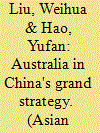

|
|
|
|
|
| Publication |
2014.
|
| Summary/Abstract |
This paper examines China's strategic interests in Australia. From the security per- spective, Beijing hopes that Australia will be a constructive factor for its peaceful rise. On the economic side, Beijing hopes that the bilateral relationship will ensure sufficient and sustainable resources and energy supplies from Australia for China's domestic needs
|
|
|
|
|
|
|
|
|
|
|
|
|
|
|
|
| 2 |
ID:
066814
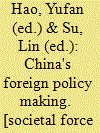

|
|
|
|
|
| Publication |
Aldershot, Ashgate, 2005.
|
| Description |
xiii, 230p.
|
| Standard Number |
0754646076
|
|
|
|
|
|
|
|
|
|
|
|
Copies: C:1/I:0,R:0,Q:0
Circulation
| Accession# | Call# | Current Location | Status | Policy | Location |
| 050404 | 327.43073090511/HAO 050404 | Main | On Shelf | General | |
|
|
|
|
| 3 |
ID:
170519
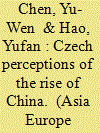

|
|
|
|
|
| Summary/Abstract |
China has increased its investment and influence in Central-Eastern European (CEE) countries through the “16 + 1” framework in 2011 and the One Belt One Road (OBOR) initiatives in 2013. Given China’s rising influence, this paper explores civilian views of China in the Czech Republic. Using survey analysis of 663 respondents in 11 Czech universities, we find that our respondents’ impression of China is neither negative nor positive. By contrast, they do not have a good impression of Russia. Their impression of Japan is the best. Our respondents recognize that China is the most influential player in Asia. Albeit divided, there is a tendency for respondents to believe that China will surpass the USA as the world’s leading power, but they cannot reach consensus on whether such development will be peaceful or not. Our survey also finds out that, while the Czech government wishes to get closer to China politically and economically, citizens are somewhat divided on various dimensions of issues concerning China. This is a pattern that continues from the past. The 2013 change of political landscape in the Czech Republic does not seem to have altered many of the societal responses to China.
|
|
|
|
|
|
|
|
|
|
|
|
|
|
|
|
| 4 |
ID:
160778
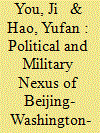

|
|
|
|
|
| Summary/Abstract |
Military tension is at the core of the Taiwan conflict. It is also a key factor for Washington to contemplate intervention. Since 2016 the level of this tension has risen due to Taipei's renunciation of the 1992 consensus and more vigorous U.S. play of the Taiwan card. This article argues that despite the war rhetoric, the three parties still strive to avert overt militarization of the conflict, as they address more urgent internal and external challenges. Beijing's Taiwan policy is still maintaining peace through threat of war amid the PLA's combat buildup. However, the trilateral relationship has entered uncharted waters leading to the near future, at least 2020. It is worth closely watching if the rising political tension will lead to a military showdown.
|
|
|
|
|
|
|
|
|
|
|
|
|
|
|
|
| 5 |
ID:
110011
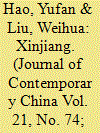

|
|
|
|
|
| Publication |
2012.
|
| Summary/Abstract |
The 5 July event in Urumqi inspired rethinking about Beijing's policy towards Xinjiang. This paper will examine Beijing's interests in Xinjiang from historical, political, economic and security perspectives, and the challenges Beijing faces in pursuing and protecting its interests. By examining the tensions between the Han and ethnic minorities, especially the Uyghurs in Xinjiang, the paper argues that the Xinjiang issue involves China's core interests and the most serious challenge Beijing faces is how to cope with ethnic tension in a highly sensitive region surrounded by big powers.
|
|
|
|
|
|
|
|
|
|
|
|
|
|
|
|